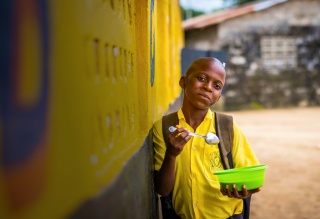It Takes Many Villages: Running a global programme on a volunteer-based model
Panji Kajani, Country Director for Zambia and Zimbabwe, shares the challenges of running a programme with community partnerships and volunteers.
One size doesn’t fit all, but we are all united with a common goal.
Mary’s Meals’ work is only possible because of the community members who contribute time and material support to ensure the school feeding programme can operate every school day.
We have learned that across many different countries, environments, and cultures, one size rarely fits all, so we start on the basis that every community gives what they can, recognising that this looks different in every location and context. What unites everyone is the genuine respect for every individual involved, and the firm belief that a community-based approach is the only way to be truly equal partners in this work. That is the foundation on which Mary’s Meals’ school feeding programme is built.
We recognise these contributions as acts of love that make this work possible, mirroring the acts of love from volunteers and donors raising awareness and funds across the world to support Mary’s Meals’ work.
Panji has worked for Mary’s Meals for more than a decade and has a huge amount of experience in helping to mobilise communities. He currently leads our work in Zambia and Zimbabwe as Country Director.
“Engaging community volunteers to run the programme helps to keep costs low but, more important than that, community empowerment makes the programme more effective and sustainable, which is why our volunteer-led model is so important.
“I love this approach. Some people don’t think it is possible and then they go to a school and they see that it works.”

The challenge of recruiting communities and volunteers
“Community mobilisation is not straightforward, it’s a continuous conversation. Leaders may be resistant to the school feeding programme or people can be reluctant to volunteer. There are different reasons for this. There may have been other feeding programmes that have ended, and that has affected the sense of trust communities might have for new organisations coming in. The Mary’s Meals model relies on partnership rather than handouts, which some people might not be used to. So, you need to build up trust with people.
“It is the same with recruiting volunteers. It is not easy, you don’t just go to a village, blow a whistle and the volunteers come.
“Community hinges on the leadership, so your access to a community depends on how the leaders view the programme. If you can mobilise the leaders, then you leave everything to them. When you are speaking to villages, you’re speaking to them through the leaders. You identify who the chief PTA (Parents/Teacher Association) person is and you leave it to them. If they call a meeting, you go but you don’t talk – you just attend to make sure you are not misrepresented.”
The Mary’s Meals approach to school feeding starts as a conversation and, as Panji says, this conversation needs to be continuous. If partnership is to be based on mutual respect and trust, we must start with common values. Everyone taking part shares the same interest: to support children’s learning in school through the provision of a daily meal. Improving the lives of children is what brings us all together and must be everyone’s top priority.
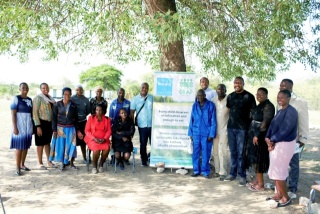
Why community ownership matters
It’s not simply about partnership between Mary’s Meals, a school and the community, it’s also essential that the community has ownership of the programme and takes responsibility for the day-to-day running of it.
Our definition of ownership includes different ways in which communities take the lead in the feeding programme across the diverse contexts where we work.
We know that when communities are engaged in the outcomes of school feeding, the quality, efficiency and reliability of the programme improves. Mary’s Meals’ school feeding cannot begin until we can be confident that the community wants to participate in, develop, nurture and sustain the programme for children coming to school.
What does a community have to contribute?
Our experience shows that with community ownership comes promotion and sustainability of the programme by all who see its value. Our programme can only succeed if the community and school remain engaged over the long term. And while the contributions a community can realistically make will vary in scope, size or regularity, there are some significant elements that they must sign up to in a formal agreement before the programme can be introduced.
These include:
- Time – we need a commitment of time from the cooks who prepare and serve the school meals, and the School Feeding Committee members who complete tasks such as coordinating a volunteer rota and monitoring stock on a daily basis.
- Materials – this includes mobilising water and providing cooking fuel. Where possible, communities also contribute supplementary ingredients if they have a school garden, and help with the construction of a school kitchen and store.
- Security – we need agreement from the School Feeding Committee that they will ensure the security of stock and equipment.
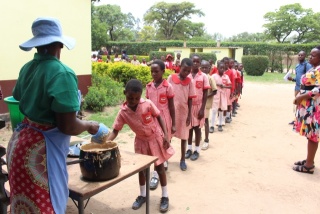
From the outset of our partnership, we agree with each community that they are expected to contribute as much as they can – and their capacity to do so should be reviewed over time. We do not prescribe the level or type of contribution that should be made because we trust in the innate goodness of community members to give what they can to support their children in school and we fundamentally believe that the school feeding programme belongs to each local community. We continue to work with communities to assess their capacity to contribute to school feeding and take more ownership of the programme over time.
While these elements are essential for the successful implementation of the school feeding programme, they can be challenging to maintain, especially when it comes to the long-term recruitment of multiple volunteers. As we heard before, Panji says this can come down to maintaining regular and continuous communication and nurturing the relationship with communities:
“It is something you have to keep working at. When you introduce the programme, there is that excitement and people come forward. You need to maintain momentum though; capacity building and awareness must be constant. So, you engage in continuous communication and keep talking to community leaders – again, they are the ones that mobilise communities, people listen more to their local leaders than they listen to us.”
With genuine ownership of the programme, communities are much more empowered to find solutions to these challenges. As Panji explains:
“People hear we have tens of thousands of volunteers and think that it’s easy. But it’s not.
“It is easier to recruit volunteers in rural areas as people are more willing to help each other. In rural areas, you could recruit different volunteers for every day if you wanted to.
“It is harder in urban areas because people are there to earn money, so they need to find work and earn with the time that they have.
“So, in urban areas, where recruiting volunteers is more challenging, the communities need to come together to work out solutions and ensure that enough people come forward to cook and serve the meals to keep the programme running. The school administrators, the Parent Teacher Associations, and Mary’s Meals field staff continuously work towards bringing these communities together to ensure meals can be served every school day.”
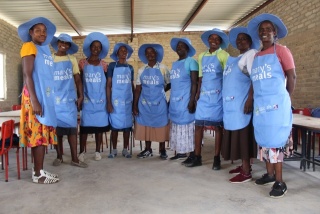
How to work together for the future
Trust and mutual respect are ever present in our relationship with schools and communities, and they are built to last. If we want to continue to keep our promise to children, we must remain as true partners in this work. However, we also have a responsibility to ensure that schools and communities have the knowledge, skills, equipment and support they need to implement the programme successfully. This is key to the programme being maintained long term:
“The communities we work with are facing huge challenges, which is why they need a school feeding programme. Ultimately, in the long term, we want there to be no need for Mary’s Meals, but until that’s possible it’s about supporting the practical running of the programme and capacity building within the community. Empowering the community is essential and that happens through effective support and modelling, so our school feeding officers and delivery partners visit schools regularly to help maintain good practice, monitor project implementation, and help identify solutions to problems.
“I tell my team – every time you have a meeting with the community, ask them ‘do you still want this programme?’ because without them it will not work.”
As with any true partnership, the direction of travel is not just one way. Mary’s Meals learns so much from the communities and schools who implement the programme too. We now have decades of experience in school feeding – importantly, with a focus on community empowerment – and it’s not just the Mary’s Meals teams that invest in and think about the long term, the communities we partner with do too.
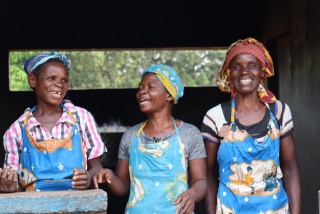
As a result, the school feeding programmes that develop are strong and set up to last. In fact, we’ve seen so many communities provide more and more for their school feeding operations that they are increasing ownership of their programme and subsequently reducing our input. This is the exact change we work hard to achieve and it is a product of the shared trust and respect between us and the communities we work with.
It’s easy to assume that anything any one person – or small group of people – could do for a global school feeding programme would be insignificant to the final impact of the whole operation. However, with Mary’s Meals it is quite the contrary – it’s precisely the small acts undertaken by many thousands of people every day that keep our school feeding programme running, giving hope to more than 2.4 million vulnerable children every school day. Local communities have got volunteering covered in the countries where we work, but there are lots of ways you can help Mary’s Meals in your own area or through your own networks.
